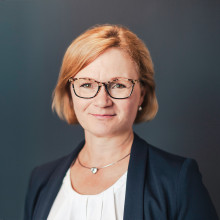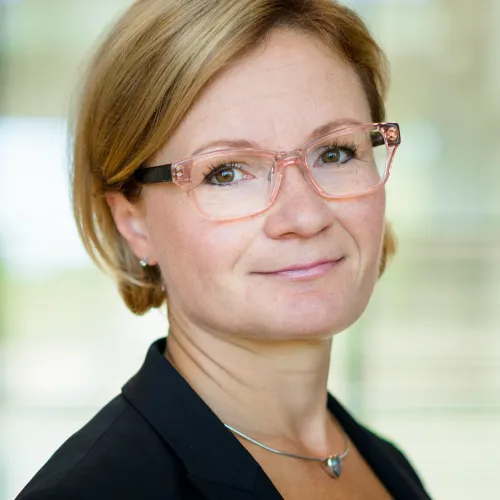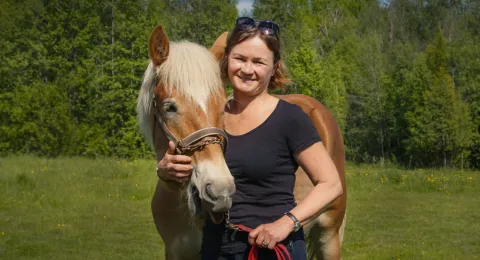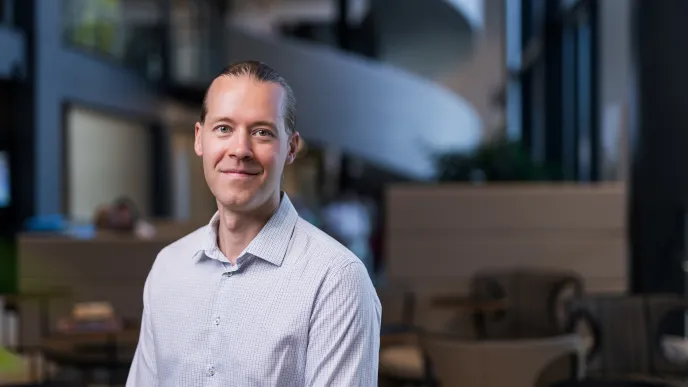LUT Business School celebrated its 30th anniversary in 2021. To mark the occasion, we published a series of interviews with the school's current and former employees and alumni. This article was first published in May 2021.
When Jaana Sandström joins an online meeting, she may be at the stables, forking manure or rubbing smelly herbal oil on the insect-bitten private parts of a horse. The oil relieves the itching.
"As you see, my private life is highly academic," jokes Sandström, Vice Rector for Education at LUT University and former dean of the LUT Business School.
Sandström (née Borgström) is the daughter of the Finnish horse racing legend Reijo Borgström. Sandström runs an equestrian farm in Lappeenranta, Finland, with her father and sister, and their horses have won national harness racing championships more than once. Their stables have produced champions like B. Helmiina, a mare, and Vekke, a stallion.
"It's a daily struggle to collar the young stallion," Sandström says.
Horse racing has cultivated Sandström's patience and ability to manage stress. A good example of work that requires persistence is the mare B. Riitu, with which Sandström has worked for nine years. The last three have seen progress and even results.
"Riitu is a highly mistrustful creature and a slow learner. This year, however, Riitu won a 7 000 euro prize, which gave me a wonderful sense of accomplishment. Our family has come to the conclusion that we have lucky decades every now and then. One was the 1980s and another was the 2000s, and it seems 2020 started another good period for us."
Working with horses has taught Sandström to put up with unexpected and annoying surprises, which she also encountered as a dean.
"As a dean, I had to calculate finances at an annual level and oversee employment relationships of differed durations. When I started working as a vice rector in 2014, it felt like a weigh had been lifted off my shoulders."
A manager can ruin everything
Sandström is one of the longest-serving employees at LUT University. She first has trouble recalling exactly how she ended up as a dean but then comes to the conclusion it was a stroke of luck.
"I was never an especially skilled researcher, but I hung in there. I was better at the administrative stuff. I was probably oblivious enough to work as a dean. I did not fully understand everything that employees were occupied with, which meant that I could not micromanage. In an organisation such as this, that would have been a catastrophic approach to leadership."
Micromanagers typically supervise and control the smallest of details in their employees' work.
By stroke of luck, Sandström means she was lucky to be considered for a job at LUT after spending a few years in Helsinki. Antero Tervonen, now a university lecturer at LUT, and Professor Hannu Rantanen recruited her for the industrial engineering and management department in 1991. Later on, she was poached by LUT Business School's perhaps best-known dean, Kalevi Kyläheiko.
At LUT Business School, Sandström started out as an accounting lecturer, wrote a doctoral dissertation, landed a professorship, and finally, ended up in the dean's shoes herself.
"We all worked awfully hard. The ICT industry was gaining momentum, and we had large collaborative projects with businesses. I was involved in research projects dealing with the forest industry. Our group was a good one – we were focused on facts and highly driven," Sandström reminisces.
According to Sandström, LUT Business School has always employed vastly different personalities, but they have shared a similar approach to work. She says her time as a dean taught her a great deal.

Sandström talks about the importance of her staff with warm tones. She points out how difficult an academic researcher's work is these days. Teaching responsibilities are extensive and student groups vary in size. Researchers stress about wanting to teach well, which then takes away from research – the raison d'être of any university. Rejection after rejection from sponsors and publishers also eat away at researchers.
"There is a very real danger of ruining everything with poor management."
In Sandström's opinion, a good manager sees to it that no one is left sulking alone in their office.
"If professors throw in the towel, no will be there to pick it up for them. People need to feel a sense of justice and fairness."
Sandström maintains that people are a resource for a company. The staff is like a fine-tuned machine, and if it is out of order, everything is.
"As a dean, I kept listening for happy sounds from the hallway. They were a good sign. If it was quiet, that was a bad sign. Remote work makes it difficult to sense the situation, which in turn makes leadership very challenging."
Sandström says that the current dean, Sami Saarenketo, has a knack hitting the right key. This is not merely a figure of speech – he is known for taking out his guitar and singing a tune or two befitting the occasion.
"The spirit of Kalevi Kyläheiko lives on, but Sami has also done a world of good. The composition of the business school's teams has been well thought out, and Sami is a beloved academic professional not only among his own but also in international circles."
The Beamer that changed the school's course
Kyläheiko – the name keeps popping up when talking to people with a long history with LUT Business School.
Many feel it is Kyläheiko who made LUT Business School what it is today. Sandström is no exception. She says that during his predecessor Kari Neilimo's office as the dean, the school's main focus was to establish its education based on conventional disciplinary silos.
"Kalevi blew up those silos. In the 2000s, our research really took off – Kalevi and his crew created that culture," Sandström says.
If Kyläheiko put the school on the map and gave research more room, many say that Sandström was the one to reform the school's education. When Sandström was in office, the school decided to pursue international accreditations – quality labels that universities can apply for as a recognition of high-quality education. However, the project got off to a sluggish start.
"Kalevi sent me to an accreditation event, which I was not very enthusiastic about at the time. I came home with a folder and let the folder rest in my bookshelf," Sandström grins.
Nevertheless, it did not take long for a Beamer from the St. Petersburg State University to drive up to the university and start negotiations for a double degree programme. Dean Valeri Katkalo urged LUT Business School to pursue international accreditation – it would help the school to stand out in global competition.
Sandström says she did not anticipate the amount of work the accreditation project would take nor its importance. Sandström credits Hanna-Kaisa Ellonen for helping LUT Business School get to the finish line. At the time, Ellonen was a professor at LUT, and she is currently working at the university of applied sciences Haaga-Helia. Sandström raves that Ellonen is "strategically sharp as a tack".
All major subjects in the school were, as Sandström puts it, split into atoms and reassembled into degree programmes. The hard work paid off: the Master's Programme in International Marketing Management (MIMM) received the EFMD quality label. In 2021, the label was renewed for a third consecutive period.
"The gentleman that he is, Kalevi would never say it out loud, but he must have been ticked off when we destroyed his life's work. That's what it must have felt like to him."
Sandström recalls that telling the staff about the programme reform was difficult. She says she was faced with opposition, but little by little, everyone got on board to make LUT stand out internationally.
Subsequently, Sandström herself has sat on the EFMD accreditation panel, deciding on whether to award quality labels to other universities. She was on the panel for three terms and says it taught her what international business education truly is.
LUT branches out
Sandström is on her second term as a vice rector. She says she gave one condition for her appointment: no subordinates. She says there were not very many applicants when she applied for the position.
As LUT University's vice rector for education, Sandström has been instrumental in revising LUT's programme portfolio. As a member of the rectorate, she has also been involved in the renewal of LUT's support services and in the merger of the Saimaa and Lahti universities of applied sciences. The outcome of the merger was the LAB University of Applied Sciences, and consolidating its functions with those of LUT University has required countless hours of work and bending over backwards by the staff.
"It's been a wild ride."
LUT is continuously developing its education by establishing new professorships. LUT Business School established an assistant professorship in sales with the help of a large donation in 2021, and a professor in the field of energy and the society is currently being sought.
LUT's board recently decided to apply for education responsibilities in social sciences from the Ministry of Education and Culture next autumn. The ministry has announced it will review applications later in the year and make decisions in early 2022.
"We need to take advantage of these opportunities to branch out," Sandström states.
Sandström applauds LUT for developing in leaps and bounds in recent years. She especially wishes to mention Jarmo Partanen, the recently retired director of the LUT School of Energy Systems.
"Jarmo reformed his school in an astonishing way. Also Dean Riina Salmimies from the LUT School of Engineering Science has been successful at her job, which undoubtedly is not the easiest."
Sandström claims her own work is easy because the schools have functional administration and heads of degree programmes. "I am left with representational duties," she kids.
Homing in on international funding
LUT's current organizational culture is, in Sandström's view, largely the accomplishment of Rector Juha-Matti "Juhis" Saksa.
"He plays the fool but is, in fact, extremely sharp-witted. Our working culture has not always been as flexible as it now is. Juhis always says that do what you want as long as you produce results."
Saksa and the rest of LUT's astute leaders will need to do their absolute best because the Finnish Government has proposed permanent cuts of 35 million euros to science funding. Sandström admits the entire LUT management was dumbfounded by the news.
"A million out of our budget stings. But as our Rector Juhis has stated, we are on a growth path and will not resort to cutbacks. Nevertheless, it will be challenging to keep up with international competition," Sandström analyses.
Looking at the future of Finnish academic research, Sandström feels the perspective it takes should be considerably wider than it is today. The university scene should not be examined merely from a national viewpoint – universities should be able to respond to international competition. In this battle, Sandström points out that EU funding alone is not enough.
"We need new international funding sources. Technology, medicine and business naturally already receive funding from business enterprises, and we at LUT cooperate closely with businesses. Nonetheless, we should seek more synergies."
For one thing, it is difficult to attract professors from abroad. Sandström mentions that especially their family members have had trouble finding employment and adapting.
"Another issue is that the Finnish education network is too extensive. We need more structural collaboration. We have shown the way by establishing a university group."
You can tell by looking at their ears
When a mare is close to giving birth, you stay up all night and watch the camera feed from the stall at least every fifteen minutes. This year, Sandström's ranch is expecting no foals, which means more free time for Sandström.
She's actually a little sorry that there are no little ones on the way.
"In June, we will turn our youngest stallion out to pasture with the rest of our yearlings. It's an incredible sight to see them interact with each other and determine who their leader is."
The Borgström ranch is located in the village of Kähärilä by the Saimaa Canal. There, in the quintessential Finnish landscape, is where Jaana Sandström grew up.
Because the family ranch was small, all additional cash flow came in handy. Therefore, the father Reijo Borgström worked full-time as a corrections officer in the nearby Konnunsuo prison, which was closed in 2011. Reijo Borgström did farm work in his spare time in between prison shifts. His wife tended to their cows, which they gave up in the late 1980s.
Jaana Sandström admits that her father has always had a nose for horses.
"Dad first bought Hovi-Tähti, successful in races and even better for breeding, half-and-half with our neighbour in the 1970s. We are already going on our fourth generation, and for example, the national championship race in Jyväskylä in 2008 included three offspring of Hovi-Tähti and B. Vilmiina: B. Helmina, B. Turolii and B. Vilunki."
The Borgström ranch does everything: breeds, rears, teaches, trains, and races.
"We have a complicated family enterprise. My sister and I are both pushing 60, my sister is still working at UPM and I at LUT. My husband keeps asking me when we will be able to focus on time together as a couple, but I'm not ready to give up horses just yet. It's a way of life," Jaana Sandström ponders.
Leisurely retirement is not a realistic goal if you are engaged in equestrian sports. Sandström's father Reijo Borgström is 80 years old and still races competitively. His daughters run the day-to-day business of the stables and help in any way they can.
Sandström says horses are a good pastime for anyone who enjoys being outdoors in bad weather, losing money and constant stress. Be that as it may, after being around horses for over 50 years, there is something rewarding in being able to tell what mood a horse is in simply by the way it points its ears – whether it is having a good day or a bad one.
Further reading:
Get to know us
- Sami Saarenketo was supposed to become a rock star but commands the stage as a modern dean
- This is the man who took LUT Business School to the world – Kalevi Kyläheiko is a character everyone remembers
Check out this alumni story
Did you know this?
Jaana Sandström
- Born and residing in Lappeenranta, Finland.
- Family: husband and two grown-up children – and several horses.
- LUT University's Vice Rector for Education since 2014.
- Started working at LUT in 1991 as an accounting lecturer.
- Defended her doctoral dissertation in strategic management accounting at LUT in 2002.
- Fixed-term professor of accounting in the early 2000s, professor of strategic management accounting since 2008.
- Dean of LUT Business School in 2009–2014.
- Vice-Dean of LUT Business School in 2007–2009.
- Runs the company Talli Ranch Oy with her father and sister. Jaana Sandström's husband and children have yet to engage in equestrian sports even though they follow competitions.
- Fun fact: "From the late 1980s on, I was a deckhand in my husband's sailing crew for nearly a decade. We competed actively in races on Lake Saimaa and in national H class races."









